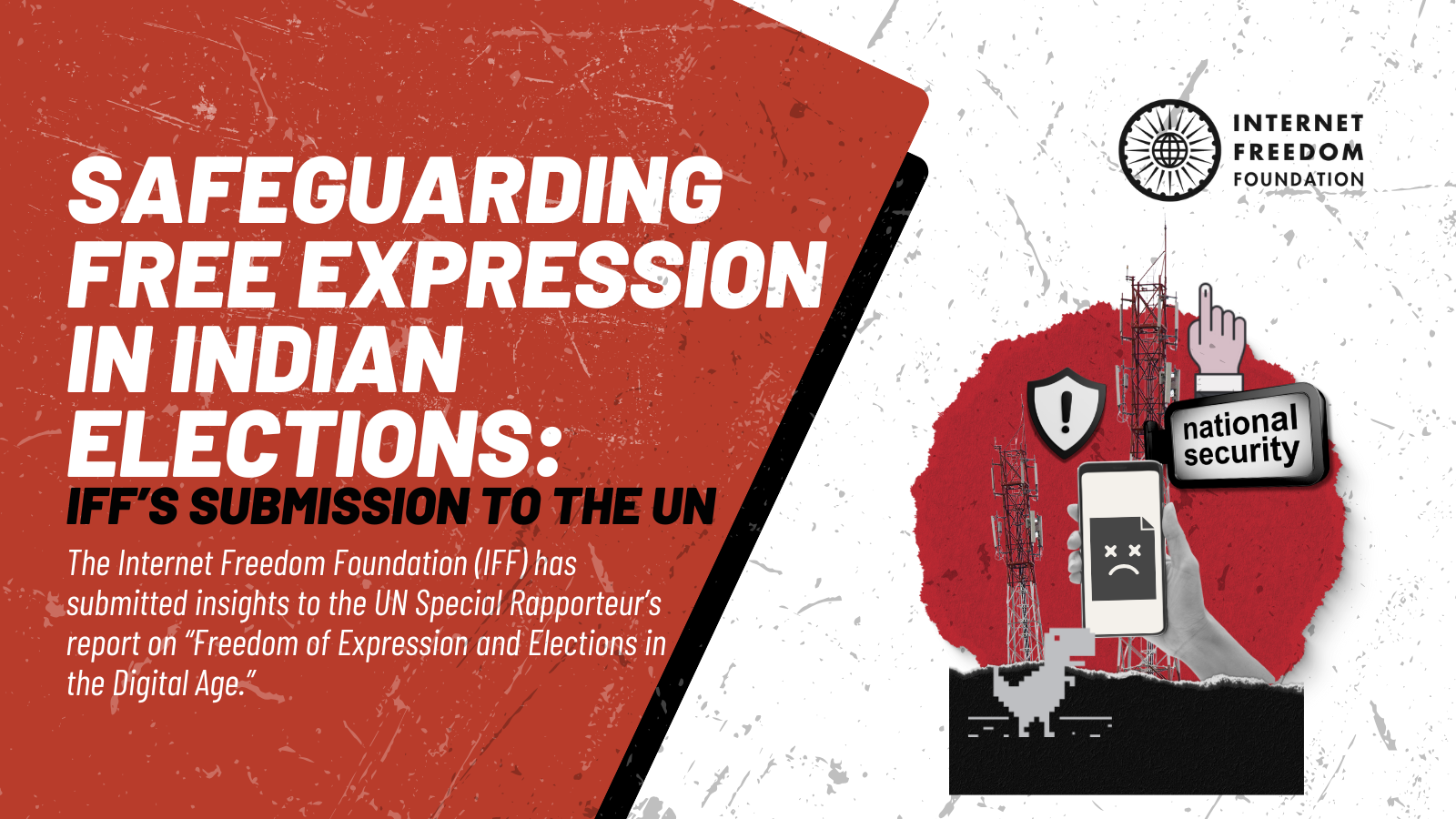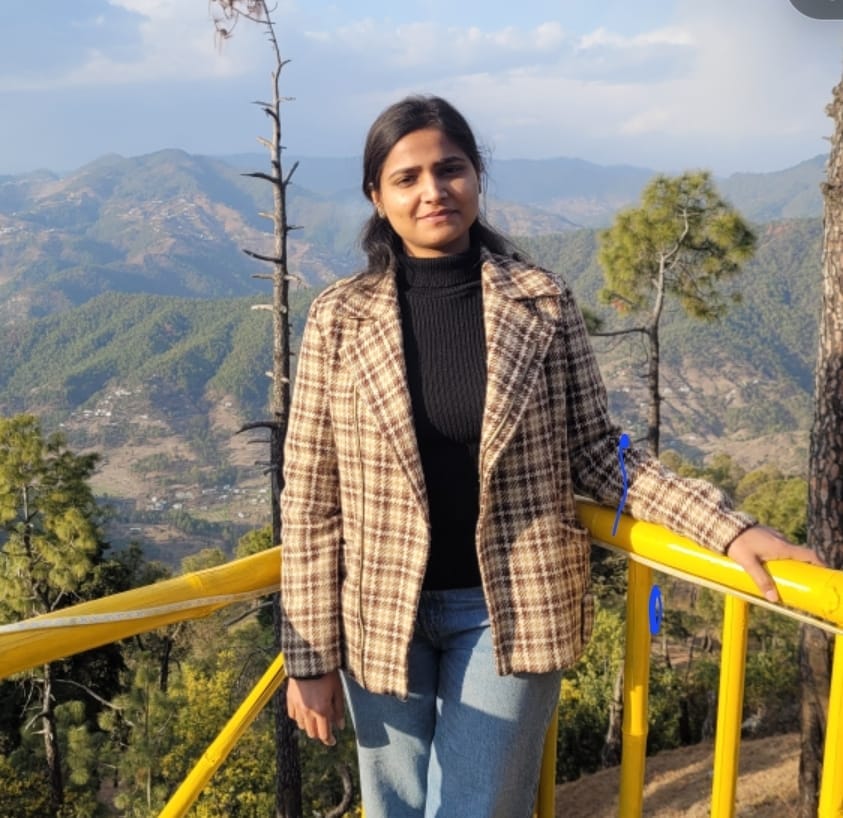
Tl;dr
IFF made submissions to the United Nations Special Rapporteur on Freedom of Opinion and Expression thematic report on “Freedom of Expression and Elections in the Digital Age”. Our submission outlines the challenges and threats to freedom of speech and expression during electoral processes in India with a focus on the role played by digital platforms. Our submission contains insights on five themes: the rise in the level of tele-connectivity and its impact on electoral processes, the censorship framework as present in India, content moderation by the Election Commission of India (“ECI”), recent regulatory developments in India pertaining to digital platforms, and our recommendations to safeguard digital rights in the electoral processes.
Background
The right to freedom of opinion and expression is requisite for the proper conduct of electoral processes in the country. The right allows both voters and political representatives to have access to relevant information and be allowed to express their thoughts and beliefs. However, this right has come under threat in India. What complicates matters is the growing role of digital technology in influencing how information flows. Although it has increased access to information, it has also been weaponized to spread misinformation, and hate speech that manipulates public opinion, undermining the legitimacy and integrity of electoral processes. The UN Report on “Freedom of Expression and Elections in the Digital Age”, which will be presented to the Human Rights Council in June 2025, seeks to assess the information environment in the electoral context and the opportunities, threats, and challenges to freedom of expression. It aims to cover a wide range of other aspects, such as the role played by the media, the safety of journalists, the role of state and non-state actors, the use of generative AI, information on the legal and regulatory framework, among others.
Our Submissions
1. Tele-connectivity and impact on Indian elections
In India, poll studies by CSDS-Lokniti for the 2024 elections have highlighted the growth of digital media beyond the urban metropolis. 29% of respondents were found to consume political material every day on digital platforms. Although television remains the main source, the use of digital platforms has surpassed newspapers and radio. Amongst the digital platforms, WhatsApp, YouTube, and Facebook were the top 3 digital platforms accessed continuously in a day. Additionally, surveys by the Telecom Regulatory Authority of India (“TRAI”) have shown that there has been an increase in the number of telecom subscribers, with 662 million in urban areas and 528 million in rural areas. The broadband Internet subscriber base also increased to 944.39 million alongside a subsequent decrease in telephone subscribers from 1205.64 million to 1,190.66 million compared to the last quarter. These statistics highlight how digital media platforms have upended traditional information platforms and the need to account for this change in assessing the electoral process and outcomes in India. However, the TRAI Report also pointed out the caveats that determine the extent of the digital divide in the country, with rural areas having a teledensity gap of 73.38% compared to urban areas, and broadband penetration in rural areas remaining comparatively lower, with 92.15% concentrated in urban areas and just 7.85% in rural areas.
2. Censorship under the Telegraph Act and IT Act
Internet censorship actions ranging from internet shutdowns to individual website/account blocking have been enforced in India. Instances include the internet blackouts imposed in the 2024 farmers' protest, the suspension of internet services in Bihar to stop clashes between rival political parties, and the internet shutdowns enforced in J&K during the 2020 District Development Council elections, among others. These orders undermine public access to information, disrupt political organizing, and weaken democratic participation. Additionally, evidence has shown how such shutdowns can escalate unrest instead of curbing it by driving up instances of violent and uncoordinated actions. This is aggravated by the limitations in accessing fact-checking tools, adding fuel to the fire.
Online censorship concerning digital platforms has seen a rise in recent years, particularly during the 2024 general elections. Provisions under the Information Technology (Procedure and Safeguards for Blocking of Access of Information by Public) Rules, 2009 (“Blocking Rules, 2009”), Section 69A of the Information Technology Act, 2000, and the Information Technology (Intermediary Guidelines and Digital Media Ethics Code) Rules, 2021(“IT Rules, 2021”) are arbitrarily imposed upon digital platforms. Platforms such as Hindutva Watch and India Hate Lab that document crimes against marginalized communities were blocked by the Ministry of Electronics and Information Technology “(MeitY”) in 2024 without following due process. During the February–March 2024 farmers’ protests, social media platforms, and protest-related content on X, YouTube, and others were blocked. Many remained suspended without explanation or access to blocking orders. X admitted to removing posts and accounts under government directives while noting “disagreement” due to the risk of penalties, including imprisonment. Such impositions force compliance and deter free speech and expression.
Apart from the existing censorship provisions, MeitY introduced a new provision under the Information Technology Amendment Rules, 2023 (“IT Amendment Rules 2023”) that compels intermediaries to block or remove any content related to the “business of the Central Government” deemed “fake, false, or misleading” by a Fact-Check Unit (“FCU”) notified by the Central Government. This new provision further ends up centralizing control by designating the government as the sole arbiter of truth. Vague terms like “fake”, “false”, and “misleading” enable the state to suppress dissent under the guise of fact-checking, creating a chilling effect that forces users and platforms into self-censorship. Non-compliance leads to criminal liability and fines, forcing over-censorship to avoid state action. Given this background, the IT Amendment Rules, 2023 were challenged in 2023 before the Bombay High Court where the government initially agreed not to operationalize the FCU but later withdrew this undertaking after a split verdict. In 2024, it was struck down for being vague, and overbroad, and for imposing a disproportionate restriction on free speech under Article 19(1)(a) of the Constitution.
3. Content moderation by the Election Commission of India
The ECI worked with platforms such as Google and Facebook before the 2019 general elections to draft a Voluntary Code of Ethics that would safeguard electoral integrity and enhance transparency in political advertising. The Code brought social media ads under the Model Code of Conduct (“MCC”), allowing the ECI to flag violations under Section 126 of the Representation of People Act, 1951. Platforms had to remove flagged content within three hours during the ‘silence period’ and report compliance. Political parties had to disclose social media ad spending, obtain precertification from the ECI and the Media Certification and Monitoring Committee (“MCMC”), and declare social media accounts. However, without a clear legal definition of “political advertising”, platforms retained discretion over its regulation. The ECI also issued warnings against the use of deepfakes which it defined as “AI-generated distorted content that spread fake information/misinformation/disinformation and distortions of facts”. Parties were instructed to remove such content within three hours. Such content-blocking orders issued by ECI citing MCC violations were not published, and RTI requests for data on the nature and the extent of these blocked contents were denied. When X published blocking orders defying ECI’s directives, the opaque functioning of the ECI was revealed. While the ECI was quick to act on the aforementioned instances, its delayed response in addressing hate speech-related content is glaring. This was seen when a cartoon depicting marginalized communities in a dehumanizing manner was not quickly taken down. The selective manner in which the provisions are enforced calls into question its effectiveness in acting as a guardian of democratic norms and in upholding public trust during elections.
4. Recent legal developments on online censorship
The changes in the digital rights framework leading up to the 2024 general election started with the IT Amendment Rules 2023 and were followed by two new additions. First, the Telecommunications Act, 2023, was introduced replacing the Telegraph Act, 1885. The Telecommunications Act, 2023 further expanded state powers, granting broader authority for surveillance and internet shutdowns. This worsened existing concerns about unchecked executive control and what it would mean for privacy, free speech, and democratic participation. Second, the Broadcasting Services (Regulation) Bill, 2023 was released by the Ministry of Information and Broadcasting (“MIB”) for public consultation. Clause 20 of the Bill titled “News and Current Affairs Programmes” can affect independent journalists and other individuals who rely on digital platforms like social media to share news, especially content critical of the government. A watermarked version of the revised Broadcasting Bill, 2024, was shared with select stakeholders during private meetings. Both the 2023 and 2024 drafts imposed compliance burdens on freelance journalists, causing liabilities, and impacting journalistic freedom while curtailing the choices available to a user in accessing news.
5. Recommendations
To ensure fairness and transparency in elections concerning the use and regulation of digital platforms, IFF provided the following recommendations:
- The ECI should scrutinize not only candidate spending but also the online spending of political parties during election campaigns.
- Political parties should disclose all their social media handles and the names and detailed contracts with those companies, IT cells, consultants, and digital officers that manage their online presence.
- Intermediaries and platforms should publish detailed reports during election periods, including information about advertisers, expenditure amounts, content of advertisements, and target demographics. Details concerning monetized social media posts such as the amounts spent and details of the targeted audiences should be monitored and published.
- ECI must publish all content-blocking orders and data about their enforcement. These actions must meet constitutional standards of legality, necessity, and proportionality.
- Amend the Blocking Rules, 2009 and IT Rules, 2021 to guarantee prior notice, opportunities for response, and public disclosure of blocking orders.
- Replace FCUs with independent, transparent bodies subject to judicial oversight to prevent misuse as tools for censorship.
- Revising the Broadcasting Bill post public consultation with civil liberty organizations, tech experts, digital platforms, end-users, journalists, and other stakeholders, ECI must adopt clear, impartial protocols to address hate speech and misinformation effectively.
- Address the digital divide by strengthening rural broadband infrastructure and promoting digital literacy programs.
Important document(s)
- IFF’s Submission to the thematic report on Freedom of Expression and Elections in the Digital Age (link).
This is a (very) concise summary of our submission to the UN Special Rapporteur on Freedom of Opinion and Expression ahead of the Human Rights Council meeting. We thank the Council for undertaking this significant and timely exercise and giving civil society organisations like IFF the opportunity to draw from their work and provide diverse perspectives to the process.
The submission made by IFF was drafted by Adv. Apar Gupta, Founder-Director; Gayatri Malhotra and Naman Kumar, Associate Litigation Counsels; and Injila Muslim Zaidi and Shravani Nag Lanka, Freedom Innovation Fellows.
This post was drafted by Alaka Rajeev, Policy Intern and reviewed by Ahsnat Mokarim, Policy Fellow.



